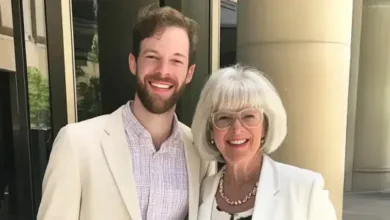My Ex-Wife Demanded the Money I Saved for Our Deceased Son.

— My Response Left Her Speechless
It had only been a few months since I lost my son, Peter. The pain was still constant, a void that filled every corner of the house. That morning, I sat in his room, surrounded by his books, drawings, and memories. The silence was deafening. He had always been brilliant — so intelligent that I used to joke he should take a paternity test because he was too smart to be mine. Of course, it was just a joke between us.
Peter had been accepted into Yale. It was the proudest day of my life. But he never made it to campus. A drunk driver took that away — and a piece of me — in November.
While trying to put my life back together, a call from my ex-wife, Susan, caught me off guard. She wanted to talk about the college fund I had saved for Peter. I ignored the call. But she showed up at my door anyway.
Without ceremony, she came in and got straight to the point:
— “Peter’s college fund… It doesn’t make sense to leave it unused. Ryan, my stepson, could really use it. He has so much potential.”
I was shocked.
— “That fund was for Peter. It’s not for your stepson.”
Susan, unfazed, replied:
— “Ryan is family. Peter would have wanted to help.”
But the truth is, she was never there. Susan left Peter when he was 12. She said she needed to focus on herself. Since then, I raised him alone. I took him to school, cheered at his games, made his lunch. Susan would show up occasionally with a birthday card, nothing more. Ryan barely knew Peter. They only spent part of one summer together — and according to Peter, they didn’t even treat him well.
Still, she insisted on another conversation. We arranged to meet at a café. There she was with Jerry, her new husband, wearing their practiced smiles. Sitting across from them, I heard the same absurd request again:
— “College is expensive. You know that. Helping Ryan would be the right thing to do,” Jerry said.
I took a deep breath. I looked at them both and said:
— “You didn’t care about Peter when he was alive. Don’t pretend now. That money isn’t yours. It never will be.”
I left the café without looking back.
That night, back in Peter’s room, I sat holding his photo. I remembered our dream: a trip to Belgium. He used to talk about the museums, the castles, and even the monks who brewed beer with such enthusiasm. It was our promise.
So, I made a decision.
I logged into the college fund account and bought the tickets. It wouldn’t be spent on anyone else. It would be used to fulfill Peter’s dream — and mine too.
A week later, I boarded the plane. I kept his photo with me the whole time. I visited museums, castles, and even an old brewery run by monks. At every stop, I imagined Peter’s excitement, his crooked smile, his endless questions.
On the last night, I sat by a canal, the city lights reflecting on the water. I pulled out his photo, held it up to the starry sky, and whispered:
— “This is for you. We did it.”
In that moment, for the first time in months, I felt peace. The pain was still there, but now it had purpose. Peter was gone, but he was with me. And that — that was our dream. I wouldn’t let anyone take it from us.
Credit Cards
Credit cards are one of the most widely used financial tools today. They offer convenience, security, and the ability to pay in installments, along with reward programs like miles and cashback. However, using them without planning can lead to serious debt. Many people mistakenly treat the card limit as an extension of their income, which is a dangerous misconception. Paying only the minimum balance results in extremely high interest rates, turning small debts into serious financial problems. To avoid this, it is essential to use credit cards responsibly, monitor expenses carefully, and prioritize paying the full balance each month.





